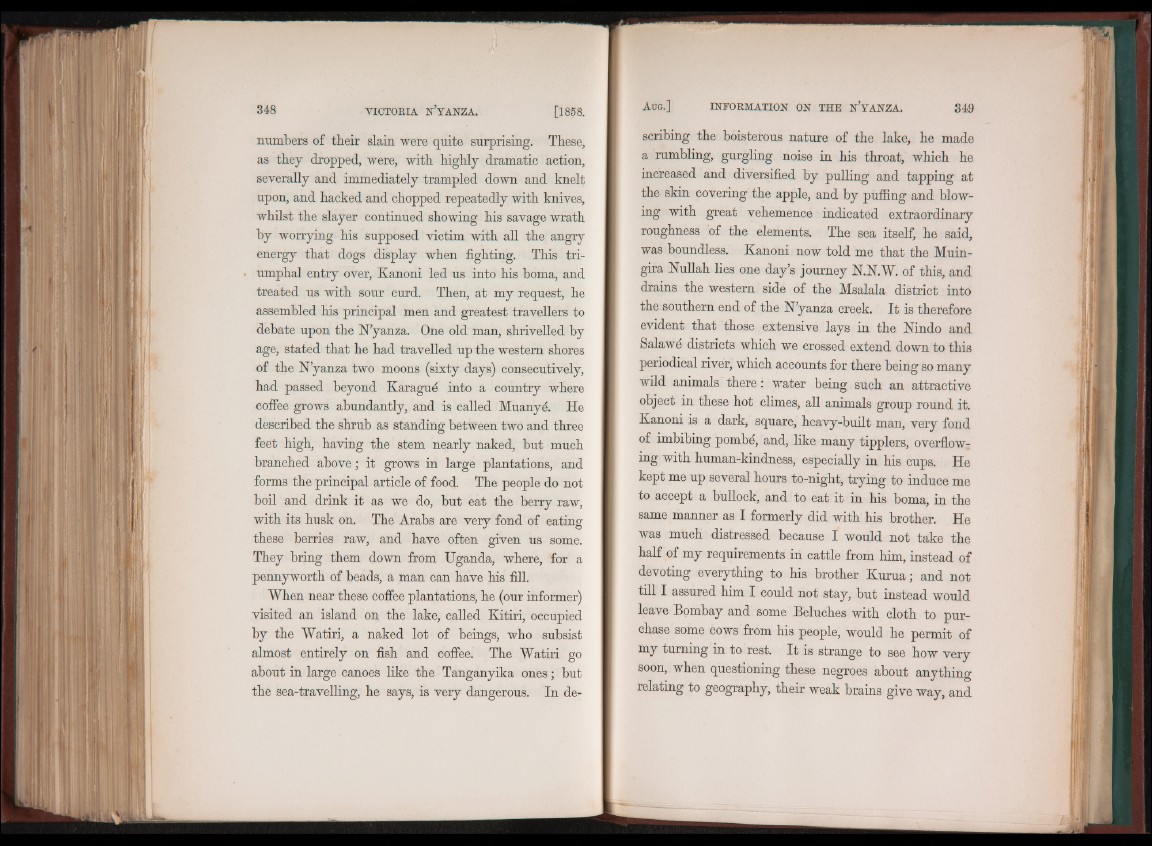
numbers of tbeir slain were quite surprising. These,
as they dropped, were, with highly dramatic action,
severally and immediately trampled down and knelt
upon, and hacked and chopped repeatedly with knives,
whilst the slayer continued showing his savage wrath
by worrying his supposed victim with all the angry
energy that dogs display when fighting. This triumphal
entry over, Kanoni led us into his boma, and
treated us with sour curd. Then, at my request, he
assembled his principal men and greatest travellers to
debate upon the N’yanza. One old man, shrivelled by
age, stated that he had travelled up the western shores
of the N’yanza two moons (sixty days) consecutively,
had passed beyond Karague into a country where
coffee grows abundantly, and is called MuanyA He
described the shrub as standing between two and three
feet high, having the stem nearly naked, but much
branched above; it grows in large plantations, and
forms the principal article of food. The people do not
boil and drink it as we do, but eat the berry raw,
with its husk on. The Arabs are very fond of eating
these berries raw, and have often given us some.
They bring them down from Uganda, where, for a
pennyworth of beads, a man can have his fill.
When near these coffee plantations, he (our informer)
visited an island on the lake, called Kitiri, occupied
by the Watiri, a naked lot of beings, who subsist
almost entirely on fish and coffee. The Watiri go
about in large canoes like the Tanganyika ones; but
the sea-travelling, he says, is very dangerous. In describing
the boisterous nature of the lake, he made
a rumbling, gargling noise in his throat, which he
increased and diversified by pulling and tapping at
the skin covering the apple, and by puffing and blowing
with great vehemence indicated extraordinary
roughness of the elements. The sea itself, he said,
was boundless. Kanoni now told me that the Muin-
gira Nullah lies one day’s journey N.N.W. of this, and
drains the western side of the Msalala district into
the southern end of the N’yanza creek. It is therefore
evident that those extensive lays in the Nindo and
Salawe districts which we crossed extend down to this
periodical river, which accounts for there being so many
wild animals there: water being such an attractive
object in these hot climes, all animals group round it.
Kanoni is a dark, square, heavy-built man, very fond
of imbibing pombd, and, like many tipplers, overflowing
with human-kindness, especially in his cups. He
kept me up several hours to-night, trying to induce me
to accept a bullock, and to eat it in his boma, in the
same maimer as I formerly did with his brother. He
was much distressed because I would not take the
half of my requirements in cattle from him, instead of
devoting everything to his brother Kurua; and not
till I assured him I could not stay, but instead would
leave Bombay and some Beluches with cloth to purchase
some cows from his people, would he permit of
my turning m to rest. It is strange to see how very
soon, when questioning these negroes about anything
relating to geography, their weak brains give way, and